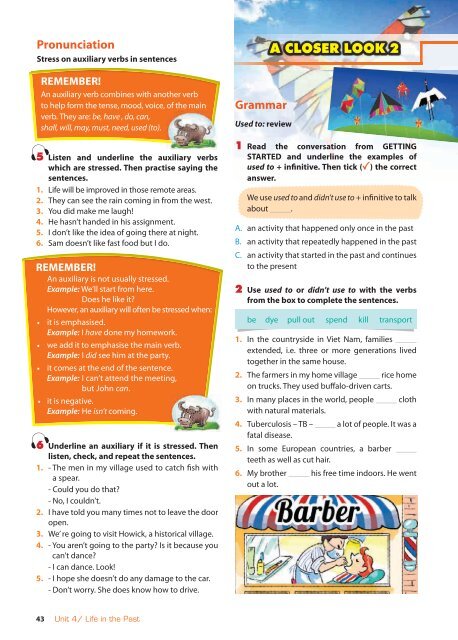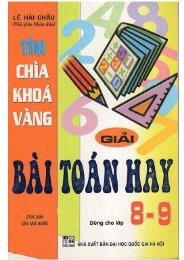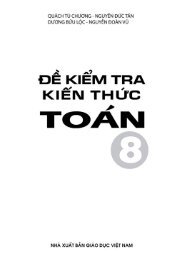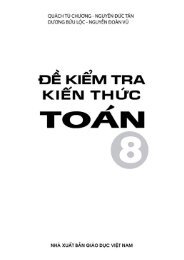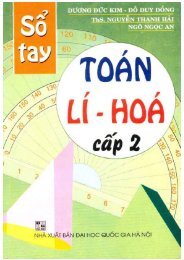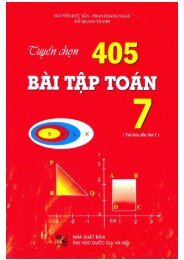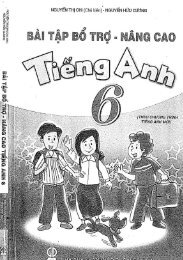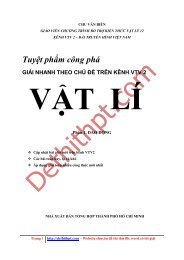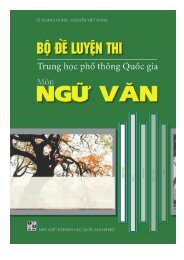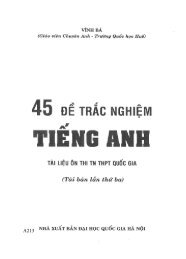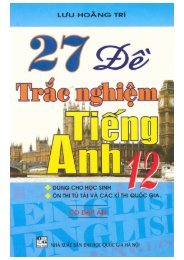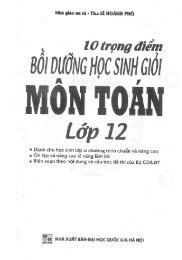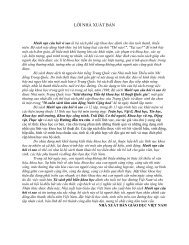Sách giáo viên Tiếng Anh 9 Thí điểm 2 tập (Pilot English 9 for Teacher)
https://app.box.com/s/rnv2yu1duebjhdpkknu2l47p9nmel5ax
https://app.box.com/s/rnv2yu1duebjhdpkknu2l47p9nmel5ax
Create successful ePaper yourself
Turn your PDF publications into a flip-book with our unique Google optimized e-Paper software.
Pronunciation<br />
Stress on auxiliary verbs in sentences<br />
REMEMBER!<br />
An auxiliary verb combines with another verb<br />
to help <strong>for</strong>m the tense, mood, voice, of the main<br />
verb. They are: be, have , do, can,<br />
shall, will, may, must, need, used (to).<br />
5 Listen and underline the auxiliary verbs<br />
which are stressed. Then practise saying the<br />
sentences.<br />
1. Life will be improved in those remote areas.<br />
2. They can see the rain coming in from the west.<br />
3. You did make me laugh!<br />
4. He hasn’t handed in his assignment.<br />
5. I don’t like the idea of going there at night.<br />
6. Sam doesn’t like fast food but I do.<br />
REMEMBER!<br />
An auxiliary is not usually stressed.<br />
Example: We’ll start from here.<br />
Does he like it?<br />
However, an auxiliary will often be stressed when:<br />
· it is emphasised.<br />
Example: I have done my homework.<br />
· we add it to emphasise the main verb.<br />
Example: I did see him at the party.<br />
· it comes at the end of the sentence.<br />
Example: I can’t attend the meeting,<br />
but John can.<br />
· it is negative.<br />
Example: He isn’t coming.<br />
6 Underline an auxiliary if it is stressed. Then<br />
listen, check, and repeat the sentences.<br />
1. - The men in my village used to catch fish with<br />
a spear.<br />
- Could you do that?<br />
- No, I couldn’t.<br />
2. I have told you many times not to leave the door<br />
open.<br />
3. We’ re going to visit Howick, a historical village.<br />
4. - You aren’t going to the party? Is it because you<br />
can’t dance?<br />
- I can dance. Look!<br />
5. - I hope she doesn’t do any damage to the car.<br />
- Don’t worry. She does know how to drive.<br />
Grammar<br />
Used to: review<br />
A CLOSER LOOK 2<br />
1 Read the conversation from GETTING<br />
STARTED and underline the examples of<br />
used to + infinitive. Then tick ( ) the correct<br />
answer.<br />
We use used to and didn’t use to + infinitive to talk<br />
about ______.<br />
A. an activity that happened only once in the past<br />
B. an activity that repeatedly happened in the past<br />
C. an activity that started in the past and continues<br />
to the present<br />
2 Use used to or didn’t use to with the verbs<br />
from the box to complete the sentences.<br />
be dye pull out spend kill transport<br />
1. In the countryside in Viet Nam, families ______<br />
extended, i.e. three or more generations lived<br />
together in the same house.<br />
2. The farmers in my home village ______ rice home<br />
on trucks. They used buffalo-driven carts.<br />
3. In many places in the world, people ______ cloth<br />
with natural materials.<br />
4. Tuberculosis – TB – ______ a lot of people. It was a<br />
fatal disease.<br />
5. In some European countries, a barber ______<br />
teeth as well as cut hair.<br />
6. My brother ______ his free time indoors. He went<br />
out a lot.<br />
43 Unit 4/ Life in the Past


